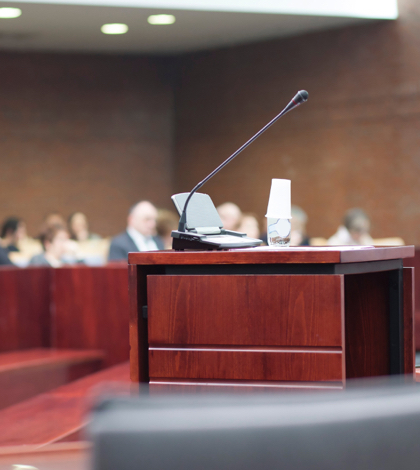Billed as the biggest corruption case in the history of San Bernardino County, three of the four defendants in the Colonies Crossroads case were acquitted of all charges last week. What went wrong? The prosecution had a case that bordered on nonexistent, several jurors said.
A major part of the case that was touted as the largest corruption scandal in the history of San Bernardino County, if not all of California, by County District Attorney Mike Ramos and Gov. Jerry Brown ended one week ago, with a dull thud.
Ultimately, it turned out to be no case at all.
After nearly eight months of testimony, a San Bernardino County Superior Court jury on Aug. 28 acquitted three of the four defendants in the Colonies Crossroads corruption trial of all charges.
Between them, Rancho Cucamonga developer Jeff Burum, former Supervisor Paul Biane and Mark Kirk, former chief of staff to then-County Supervisor Gary Ovitt faced 11 counts of bribery, improper influence and conflict of interest.
Handed down in May 2011, those charges were filed in connection with the development of Colonies Crossroads and Colonies at San Antonio, the 434-acre retail and residential project next to the Foothill Freeway in Upland.
Prosecutors from the county District Attorney’s office and the state Attorney General’s office alleged that the three defendants and co-defendant James Erwin – former assistant county assessor who is being tried by a separate jury – engaged in an illegal scheme to get a $102 million settlement out of the county Board of Supervisors.
That settlement, which concerned who would build a flood control channel on the Colonies Crossroads property, was reached in November 2006. That ended a five-year legal battle regarding that matter, while opening the door for the development of Colonies Crossroads.
Burum was a co-partner in Colonies Partners LP, the investment group that built that project. He was accused of making $400,000 in political contributions to political action committees connected to the three defendants and Bill Postmus, a former supervisor who entered a plea agreement and testified during the trial.
Those payments were bribes made after the settlement to sham political action committees, according to the prosecution team.
The jury didn’t buy those charges. It began deliberating late Aug. 23, met for a full day the next day but took Friday Aug. 25 off.
A verdict was reached by mid-morning the following Monday.
“We had some procedural things that we need to clarify, but other than that there wasn’t much to it,” said Allison Woolley, a juror from Running Springs, said of the deliberations. “In the end, [the prosecution] put up a lot of evidence that wasn’t very strong. None of us felt like they proved anyone was guilty.”
Another juror agreed, saying prosecutors never came close to meeting the “beyond a reasonable doubt” standard needed to merit a guilty verdict.
“There was absolutely no evidence that any crime was committed,” said Daniel Morris, a Redlands resident. “The prosecution didn’t put up anything we thought was solid.”
Throughout the trial there were signs that the prosecution was on shaky ground. The 2011 indictment contained 29 criminal counts, 18 of which had been dismissed by the time Judge Michael A. Smith handed the case over to the jury.
That included a conspiracy charge that Smith threw out shortly after the trial started in January.
After seven months of testimony that was often extremely detailed and filled with multiple characters, defense attorneys called no witnesses. That was a clear sign that they believed prosecutors hadn’t proven their case.
When the verdicts were read, the defendants exchanged hugs and handshakes with their families and supporters, but for the most part the reaction was subdued. One reason for that was Irwin, whose jury had just begun its deliberations.
“It doesn’t feel like it’s over yet,” Biane said two days after his acquittal. “I’m still concerned with what’s going to happen with Jim.”
Erwin’s jury continued deliberating Friday morning without reaching a verdict. It’s scheduled to resume Tuesday morning.
Burum, who wept openly after the verdicts were read, thanked the jurors for their hard work but could not resist taking a parting shot at the prosecutorial team.
“I am grateful to all of jurors,” Burum said. “Those people gave up seven months of their lives and their careers to make sure that justice was done, and they made the right decision. [But] no one should ever have to wait seven years to defend themselves in court,” Burum said. “Not anyone. Ever.”
Knowing he was innocent made dealing with the stress of the trial easier, Burum said.
“I’m built differently than most people when it comes to things like that,” Burum said. “I didn’t lose any sleep because I knew I hadn’t done anything wrong. I also knew that the trial was politically motivated and the charges were filed for political gain. Shame on them for doing that, and shame on them for being so arrogant.”
Peter Scalisi, Kirk’s attorney, made a prophetic comment immediately after he and his fellow defense attorneys rested their respective cases.
When asked about the jury’s body language, he noted that several jurors seemed to be unmoved by the prosecution’s presentation, but that those same individuals would become more alert during cross examination.
“I love what I’m seeing,” Scalisi said at the time.
 IE Business Daily Business news for the Inland Empire.
IE Business Daily Business news for the Inland Empire.


